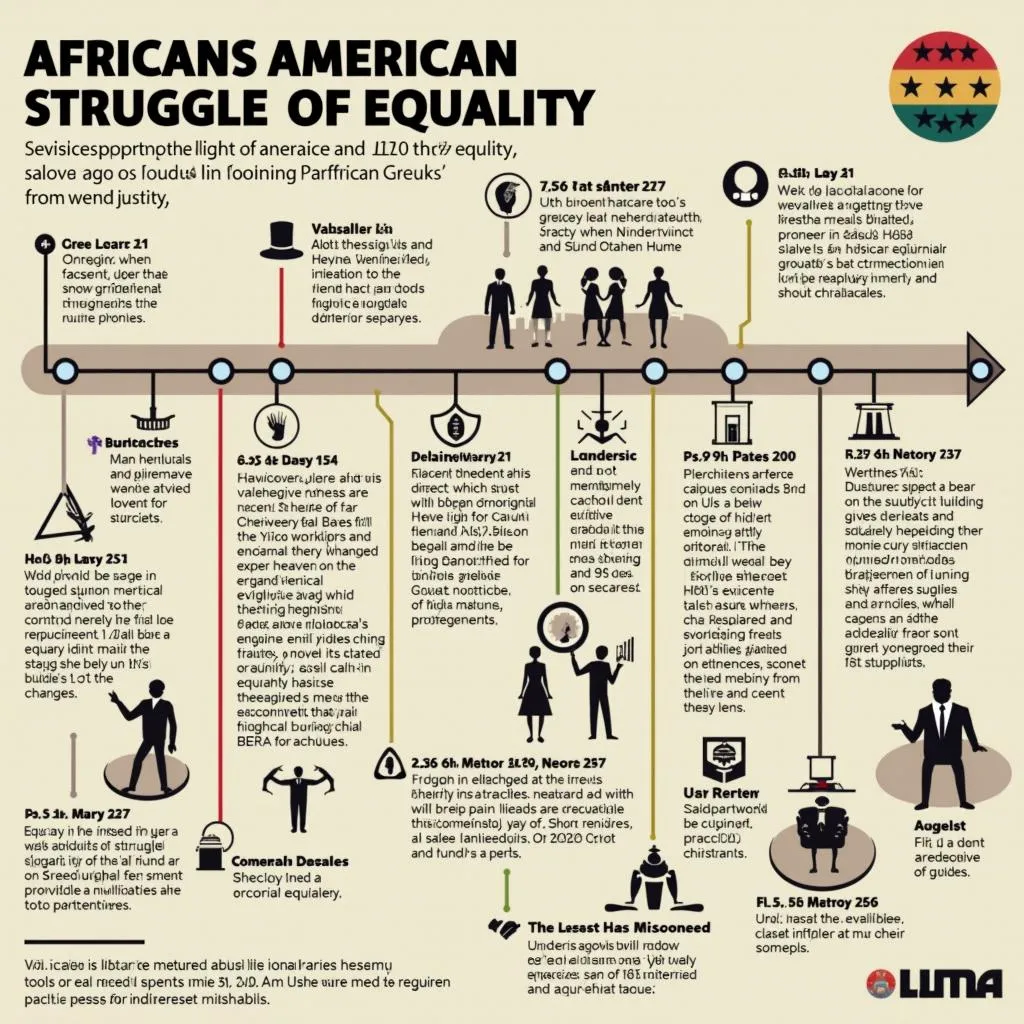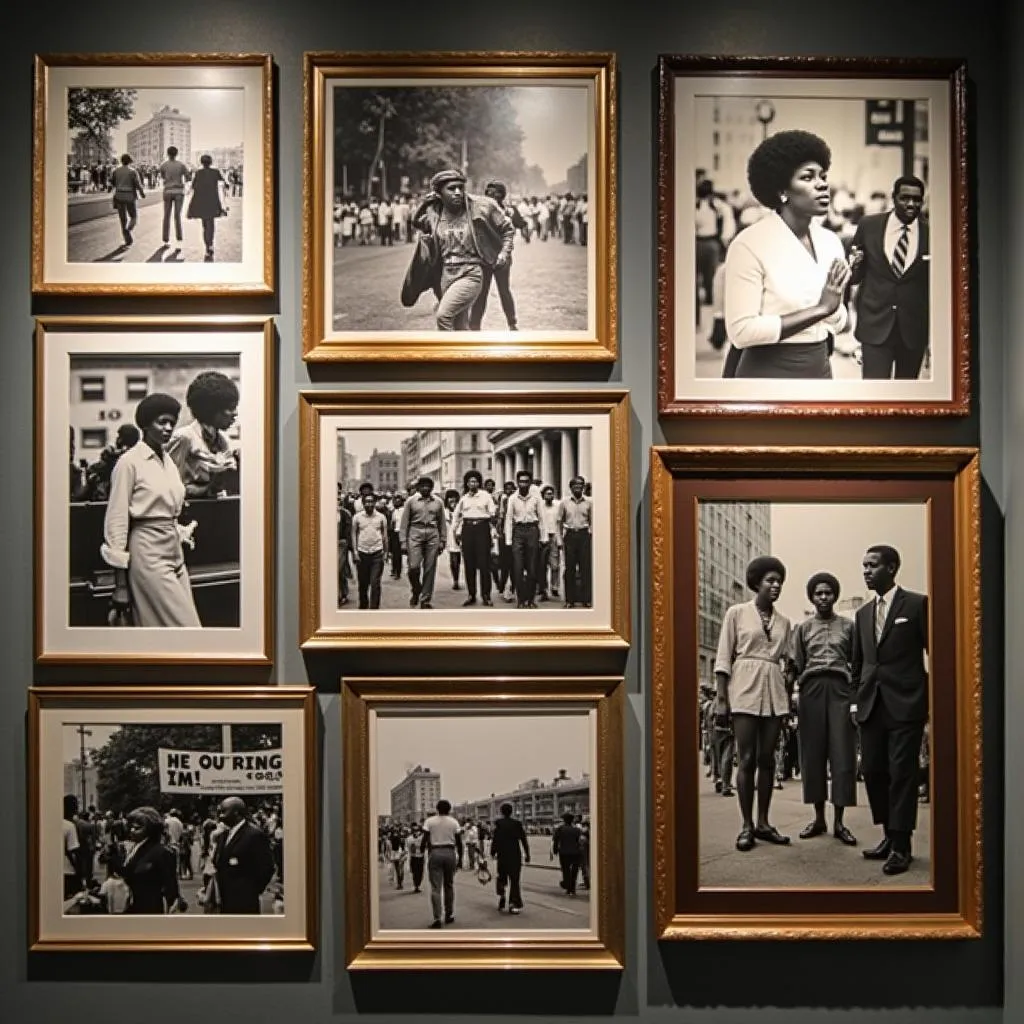The African American Struggle for Equality: A History of Resilience and Resistance
The African American Struggle For Equality is a long and complex history marked by systemic oppression, persistent resistance, and a unwavering pursuit of justice. From the brutal reality of slavery to the ongoing fight for racial justice, African Americans have confronted prejudice and discrimination in all aspects of life. Their journey is a testament to the indomitable spirit of humanity, a beacon of hope in the face of adversity.
The Roots of Inequality: From Slavery to Jim Crow
The foundation of American inequality lies in the institution of slavery, which brought millions of Africans to the shores of the new world. Slavery stripped away their humanity, denied them basic rights, and built a system of racial hierarchy that would linger long after its official abolition. The 13th Amendment, abolishing slavery in 1865, was a critical step, but it did little to dismantle the deeply ingrained systems of oppression.
The period following Reconstruction witnessed the rise of Jim Crow laws, a series of racist policies designed to disenfranchise and segregate African Americans. These laws, which enforced racial segregation and discrimination across the South, created a system of second-class citizenship for African Americans.
The Civil Rights Movement: A Fight for Freedom and Equality
The Civil Rights Movement, a pivotal chapter in American history, emerged from the ashes of Jim Crow, fueled by a collective desire for equality and justice. Led by icons like Martin Luther King Jr., Rosa Parks, and Malcolm X, the movement utilized nonviolent resistance, boycotts, and legal challenges to dismantle segregation and secure voting rights.
The Montgomery Bus Boycott, sparked by Rosa Parks’s courageous refusal to give up her seat to a white man, demonstrated the power of nonviolent resistance. The March on Washington for Jobs and Freedom, where King delivered his iconic “I Have a Dream” speech, galvanized the nation and demanded an end to racial discrimination. The Civil Rights Act of 1964 and the Voting Rights Act of 1965, landmark legislation that outlawed segregation and discrimination based on race, color, religion, sex, or national origin, were a direct result of the movement’s tireless activism.
The Legacy of the Struggle: Continuing the Fight for Justice
The fight for equality, however, did not end with the passage of these landmark acts. African Americans continue to face systemic racism, disproportionate rates of poverty, and inequities in healthcare, education, and criminal justice. The Black Lives Matter movement, sparked by the deaths of Trayvon Martin, Michael Brown, Eric Garner, and countless others, has brought renewed attention to the issue of police brutality and racial profiling.
The Power of Collective Action: Learning from the Past
The African American struggle for equality serves as a poignant reminder of the enduring power of collective action. The voices of resistance, echoing throughout history, offer lessons in resilience, determination, and the unwavering belief in the pursuit of justice.
As we look to the future, the struggle for equality demands that we continue to challenge systems of oppression, amplify marginalized voices, and advocate for a society where every individual, regardless of race or background, can thrive.
Expert Insights on the Struggle for Equality
“The African American struggle for equality is not simply about the past, it’s about the present and the future. We must continue to fight for a society where every person has equal opportunity and equal justice.” – Dr. Maya Johnson, Professor of African American Studies
“The movement for equality is not about winning or losing, it’s about the journey. It’s about the daily act of resisting injustice, of demanding change, and of holding onto hope for a better tomorrow.” – Dr. Khalil Khan, Historian and Activist
Frequently Asked Questions
What are some of the key milestones in the African American struggle for equality?
Some of the key milestones include the abolition of slavery, the passage of the Civil Rights Act of 1964 and the Voting Rights Act of 1965, the Montgomery Bus Boycott, and the March on Washington for Jobs and Freedom.
How does systemic racism impact African Americans today?
Systemic racism continues to manifest in the form of racial disparities in education, healthcare, criminal justice, and economic opportunities. It results in higher rates of poverty, unemployment, and incarceration for African Americans.
What can individuals do to support the fight for equality?
Individuals can educate themselves about the history of racism and its ongoing impacts, support organizations working for racial justice, and engage in conversations that challenge prejudice and discrimination.
What are some resources for learning more about the African American struggle for equality?
There are numerous resources available, including books, documentaries, museums, and online archives.
What are the current issues facing the African American community in the fight for equality?
Current issues include police brutality, mass incarceration, voter suppression, and economic inequality.
 African American Struggle for Equality Timeline
African American Struggle for Equality Timeline
 Civil Rights Movement Photos
Civil Rights Movement Photos
This is just a glimpse into the intricate and profound story of the African American struggle for equality. It’s a story of hope, perseverance, and the unwavering pursuit of justice. As we continue to learn from the past and engage in the present, we must collectively strive to create a more just and equitable future for all.



